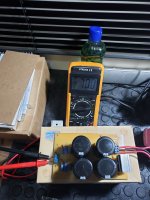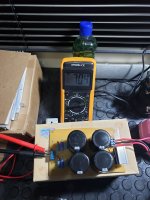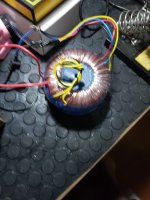Good evening guys!
I mounted a power supply using a 45-0-45 VAC 12A toroidal.
I also used 4 capacitors of 10,000uF X 80V each.
The rectifier bridge is a G2SB60 that promises to be 20A.
I did the first test using a 12-0-12 VAC 1A transformer and the power supply worked well.
When the toroidal was turned on, the line filter fuse burned 2 times and the 10,000 f capacitors warmed , they became lukewarm.
I already checked and the power supply has no short circuit.
The toroidal is with 49-0-49 VAC without load.
Can anyone get a sense of what's going on?
Thank you.
I mounted a power supply using a 45-0-45 VAC 12A toroidal.
I also used 4 capacitors of 10,000uF X 80V each.
The rectifier bridge is a G2SB60 that promises to be 20A.
I did the first test using a 12-0-12 VAC 1A transformer and the power supply worked well.
When the toroidal was turned on, the line filter fuse burned 2 times and the 10,000 f capacitors warmed , they became lukewarm.
I already checked and the power supply has no short circuit.
The toroidal is with 49-0-49 VAC without load.
Can anyone get a sense of what's going on?
Thank you.
Last edited:
Sorry for the fault.
The font layout and drawing are now attached.
The difference of the power supply of the attached project for which I mounted is the addition of 2 more capacitors of 10.000uF X 80V.

https://www.te1.com.br/wp-content/uploads/2008/12/fonte-simetrica-ponte-retificadora.png
The font layout and drawing are now attached.
The difference of the power supply of the attached project for which I mounted is the addition of 2 more capacitors of 10.000uF X 80V.

https://www.te1.com.br/wp-content/uploads/2008/12/fonte-simetrica-ponte-retificadora.png
I see three possibilities for the fuse to burn: 1) the inrush current surge is enough to blow the fuse before the capacitor bank is fully charged, 2) the transformer magnetization drifts such that the core reaches saturation in one side, 3) the capacitors get heated and start leaking.
Ad 1), what type of fuse do you use (quick or slow)? You for a start write that the fuse burns immediately. But, then you write that the transformer operates long enough to heat the capacitors. Immediately or after a little while?
Ad 2), if you let the transformer run without the rectifier and capacitor bank, can it then run long time without burning the fuse? If you insert a 1Ohm power resistor in the input line "AC-2", does it still burn the fuse?
Ad 3), the capacitors heat by themselves and not due to proximity with the 2.2KOhm resistors? When you do the test and the fuse burns, are the outputs DC-1 to DC3 loaded? With how much? Capacitors may heat due to excessive ripple current, what brand and type are they?
Capacitors heating does not sound good.
Ad 1), what type of fuse do you use (quick or slow)? You for a start write that the fuse burns immediately. But, then you write that the transformer operates long enough to heat the capacitors. Immediately or after a little while?
Ad 2), if you let the transformer run without the rectifier and capacitor bank, can it then run long time without burning the fuse? If you insert a 1Ohm power resistor in the input line "AC-2", does it still burn the fuse?
Ad 3), the capacitors heat by themselves and not due to proximity with the 2.2KOhm resistors? When you do the test and the fuse burns, are the outputs DC-1 to DC3 loaded? With how much? Capacitors may heat due to excessive ripple current, what brand and type are they?
Capacitors heating does not sound good.
Last edited:
Any capacitor that gets warm has a lot of current going through it.
This would be supported by the fuses blowing.
The most likely cause is the capacitors:
- being reverse polsrised. I.e. they are connected the wrong way around; or
- being over voltaged.
Both these could cause the symptoms you see.
To test:
- Grab a low Voltage DC power supply, or even a 9V battery.
- Connect the Negative of the power supply or battery to GND, positive to either AC input
- Check the POSITIVE cap has about POSITIVE 7-8 volts charge.
--> Repeat with POSITIVE of battery to GND, NEG to an AC input.
- Look for NEGATIVE voltage on the Neg cap.
If this is OK, then the caps are in the right way around, and I would suspect the voltage rating is being exceeded.
If it works, increase the voltage until you see something interesting happen. A safe way to do this is to put a 100 Ohm resistor in series with the AC input on your rectifier PCB.
This would be supported by the fuses blowing.
The most likely cause is the capacitors:
- being reverse polsrised. I.e. they are connected the wrong way around; or
- being over voltaged.
Both these could cause the symptoms you see.
To test:
- Grab a low Voltage DC power supply, or even a 9V battery.
- Connect the Negative of the power supply or battery to GND, positive to either AC input
- Check the POSITIVE cap has about POSITIVE 7-8 volts charge.
--> Repeat with POSITIVE of battery to GND, NEG to an AC input.
- Look for NEGATIVE voltage on the Neg cap.
If this is OK, then the caps are in the right way around, and I would suspect the voltage rating is being exceeded.
If it works, increase the voltage until you see something interesting happen. A safe way to do this is to put a 100 Ohm resistor in series with the AC input on your rectifier PCB.
"When the toroidal was turned on, the line filter fuse burned 2 times and the 10,000 f capacitors warmed , they became lukewarm."
The 10,000uf 80v caps should not be warm, 49v x 1.414 = 69.3 volts.
from your statement above the caps are in backwards.
Put a 40 to 100 watt light bulb in series with the transformer primary, this will limit the input rush current.
The light will light bright upon turn ON then dim after caps charge. If the light stays bright, the caps are in backwards and or you have some other wiring problem.
Duke
The 10,000uf 80v caps should not be warm, 49v x 1.414 = 69.3 volts.
from your statement above the caps are in backwards.
Put a 40 to 100 watt light bulb in series with the transformer primary, this will limit the input rush current.
The light will light bright upon turn ON then dim after caps charge. If the light stays bright, the caps are in backwards and or you have some other wiring problem.
Duke
I see three possibilities for the fuse to burn: 1) the inrush current surge is enough to blow the fuse before the capacitor bank is fully charged, 2) the transformer magnetization drifts such that the core reaches saturation in one side, 3) the capacitors get heated and start leaking.
Ad 1), what type of fuse do you use (quick or slow)? You for a start write that the fuse burns immediately. But, then you write that the transformer operates long enough to heat the capacitors. Immediately or after a little while?
Ad 2), if you let the transformer run without the rectifier and capacitor bank, can it then run long time without burning the fuse? If you insert a 1Ohm power resistor in the input line "AC-2", does it still burn the fuse?
Ad 3), the capacitors heat by themselves and not due to proximity with the 2.2KOhm resistors? When you do the test and the fuse burns, are the outputs DC-1 to DC3 loaded? With how much? Capacitors may heat due to excessive ripple current, what brand and type are they?
Capacitors heating does not sound good.
Thanks for the reply Faux.
Line filter fuse is 5A and fast type.
The capacitors become lukewarm within a fraction of a second.
The entire test was done without load on the DC outputs.
What intrigues me most is that the capacitors even get lukewarm, but using a 12-0-12 VAC x 1A transformer, the power supply works normally.
If the capacitors were inverted, would not they burst?
They are EPCOS brand.
Any capacitor that gets warm has a lot of current going through it.
This would be supported by the fuses blowing.
The most likely cause is the capacitors:
- being reverse polsrised. I.e. they are connected the wrong way around; or
- being over voltaged.
Both these could cause the symptoms you see.
To test:
- Grab a low Voltage DC power supply, or even a 9V battery.
- Connect the Negative of the power supply or battery to GND, positive to either AC input
- Check the POSITIVE cap has about POSITIVE 7-8 volts charge.
--> Repeat with POSITIVE of battery to GND, NEG to an AC input.
- Look for NEGATIVE voltage on the Neg cap.
If this is OK, then the caps are in the right way around, and I would suspect the voltage rating is being exceeded.
If it works, increase the voltage until you see something interesting happen. A safe way to do this is to put a 100 Ohm resistor in series with the AC input on your rectifier PCB.
Thanks for the reply Googlyone.
Using a 12-0-12 VAC x 1A transformer, the power supply operates normally, positive and negative voltages.
If the capacitors were inverted, would not they burst?
The voltage supplied by my toroidal transformer is compatible with that supported by the capacitors.
Did I buy fake capacitors?
The capacitance is ok, I measured with capacimeter.
"When the toroidal was turned on, the line filter fuse burned 2 times and the 10,000 f capacitors warmed , they became lukewarm."
The 10,000uf 80v caps should not be warm, 49v x 1.414 = 69.3 volts.
from your statement above the caps are in backwards.
Put a 40 to 100 watt light bulb in series with the transformer primary, this will limit the input rush current.
The light will light bright upon turn ON then dim after caps charge. If the light stays bright, the caps are in backwards and or you have some other wiring problem.
Duke
Good night Duke!
The answers made me a bit sad, definitely the capacitors are not reversed. Using a low voltage transformer (12-0-12) I have DC positive and negative DC voltages.
I'm guessing these capacitors are fake. And here in Brazil is very common the existence of false electronic components.
The only explanation of the warmed capacitor is short circuit. I would check the bridge.
Goodnight friend!
Could the bridge be faulty where it works well with low voltage and low current, but does it malfunction with high voltage and high current?
Because in the first situation the power supply works normally.
Good night guys.
I went back to work with the power supply, and now rested, I found the problem.
I made a basic mistake.
I did not invert the capacitors, but ... I reversed the rectifying bridge !!! Oh my God !!!
I installed it in the correct position and the power supply worked perfectly, without heating the capacitors and without burning fuse.
So the best thing to do is to stop a bit to rest and then continue the work.
Many thanks to everyone who helped me fix the power supply.
I went back to work with the power supply, and now rested, I found the problem.
I made a basic mistake.
I did not invert the capacitors, but ... I reversed the rectifying bridge !!! Oh my God !!!
I installed it in the correct position and the power supply worked perfectly, without heating the capacitors and without burning fuse.
So the best thing to do is to stop a bit to rest and then continue the work.
Many thanks to everyone who helped me fix the power supply.
Attachments
Last edited:
Thanks for the reply Faux.
Line filter fuse is 5A and fast type.
The capacitors become lukewarm within a fraction of a second.
The entire test was done without load on the DC outputs.
What intrigues me most is that the capacitors even get lukewarm, but using a 12-0-12 VAC x 1A transformer, the power supply works normally.
If the capacitors were inverted, would not they burst?
They are EPCOS brand.
Indeed unusual. A guess, the capacitors do not handle the close to 70V well and leak. With your 12V transformer you can test if they are polarized correctly (according to what is marked on the capacitors). If you leave them for longer time with the big transformer they will probably explode.
FWIW EPCOS, formerly Siemens and currently owned by TDK has a huge Factory in Brazil, since 1954Where did you source these 10mF's from?
Best regards!
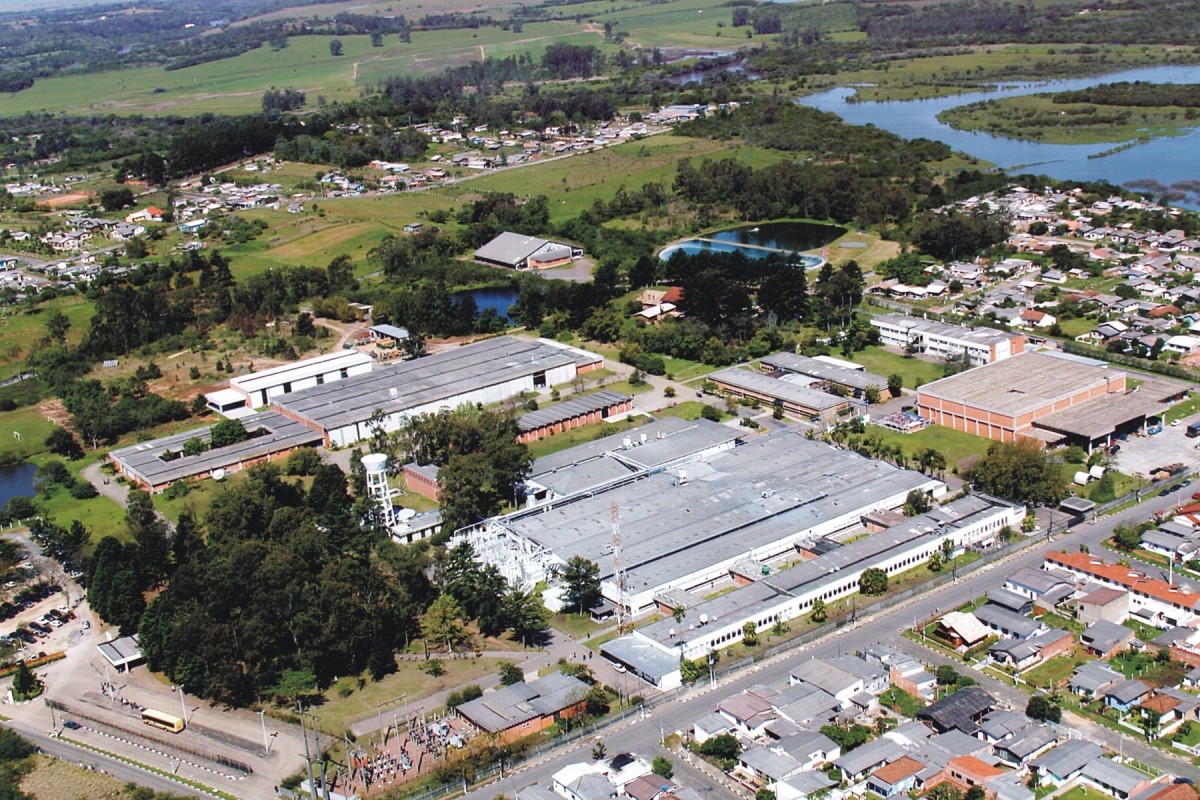
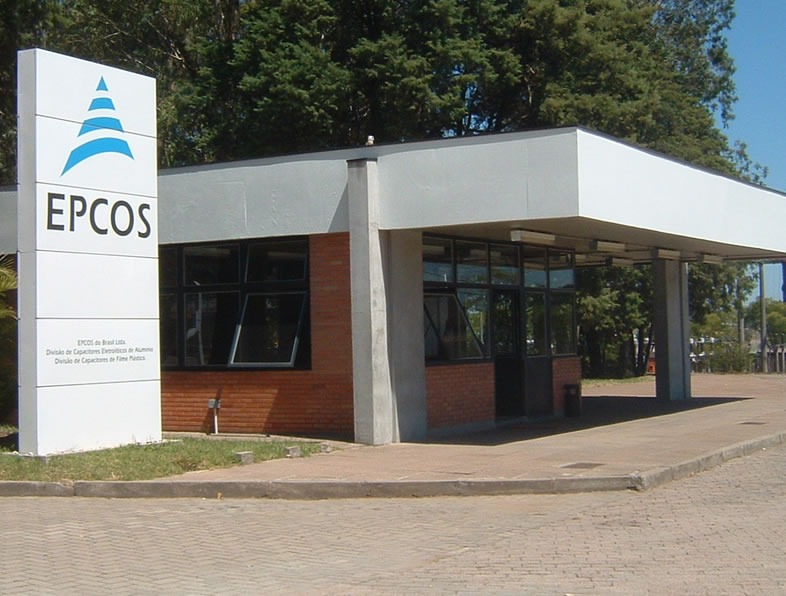
Last edited:
The only way I can imagine a capacitor can heat up by itself is by allowing an important DC-current to pass. The voltage is there (around 70V) and the current must also be there.
I would try to remove the capacitors from the board though it is some work.
He's already fixed the problem
- Status
- This old topic is closed. If you want to reopen this topic, contact a moderator using the "Report Post" button.
- Home
- Amplifiers
- Power Supplies
- Power Supply heating the capacitors and burning line filter fuses immediately

